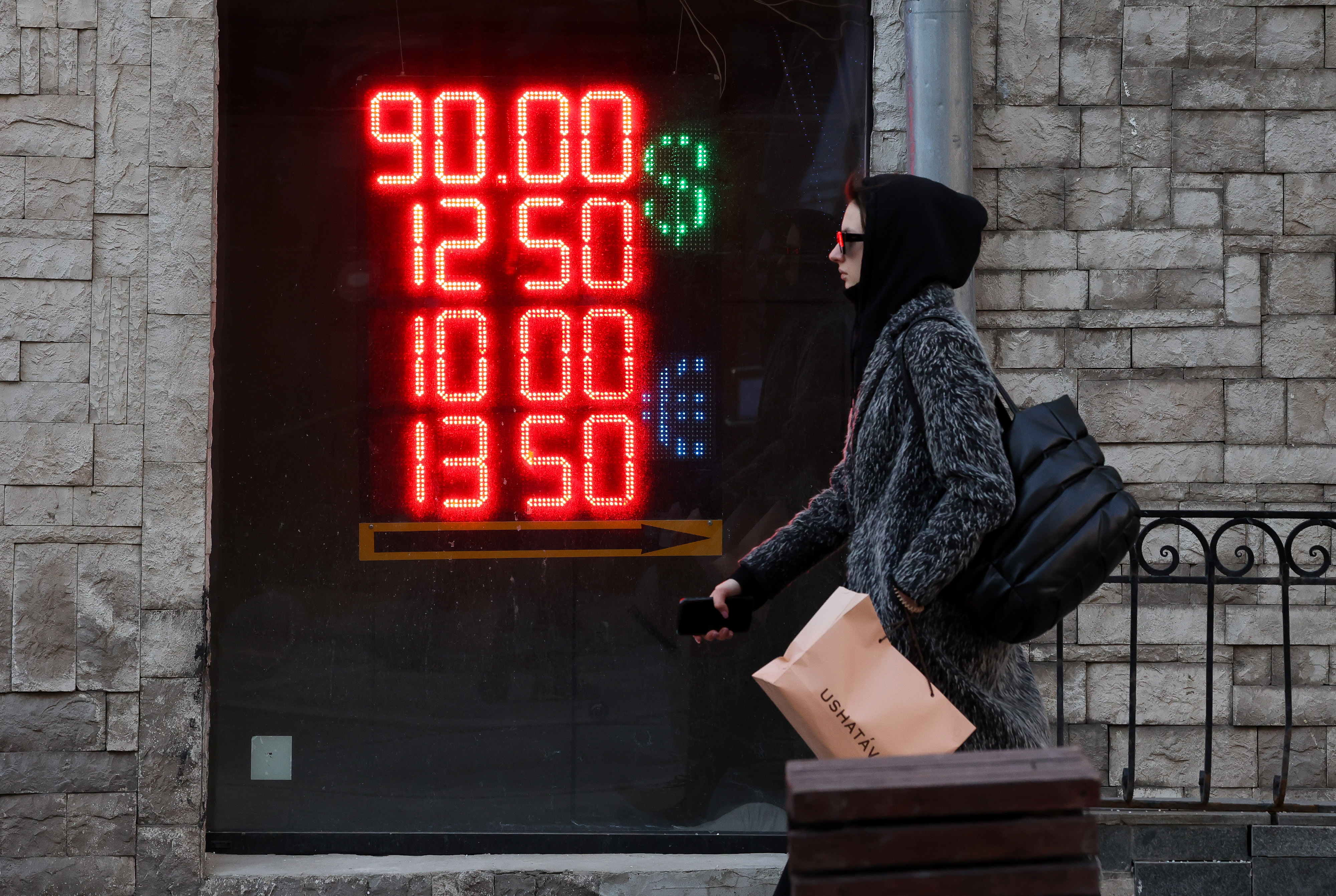It took a full-scale invasion by Russia into Ukraine to get the international community to apply a range of sanctions against the attacking country.
The most severe penalty was the move to sever certain Russian banks from the international payment order system SWIFT and prevent the Russian Central Bank from accessing its foreign reserves, which are estimated at over $640 billion
Without SWIFT, Russian businesses using those banks will lose access to smooth, secure and instantaneous transactions, complicating payments. Ukrainian investment banker Serhiy Fursa called it a “terrible blow” against an economy.
Without its foreign reserves, Moscow will have a much harder time shoring up the economy and protecting the ruble, as well as financing the expensive war on its western neighbor. It has many knock-on effects for Russian companies and their foreign counterparties.
"Cutting banks off will stop them from conducting most of their financial transactions worldwide and effectively block Russian exports and imports," said Ursula von der Leyen, the President of the European Commission.
"Putin embarked on a path aiming to destroy Ukraine, but what he is also doing, in fact, is destroying the future of his own country.”
Sanctions have also been leveled against Russian President Vladimir Putin and people in his inner circle such as Foreign Minister Sergei Lavrov and the entire Russian national security council and multiple oligarchs. Countries have also targeted Russian oligarchs and their wealth outside Russia, a lot of which is in posh European capitals.
U.S. sanctions also disrupt Russia’s global supply chains, making it much harder to secure a range of goods, including important tech like microchips.
At the same time, all EU countries have closed their airspace to Russia, which could have a destructive domino effect on the economy, experts have said.
Even Switzerland broke its historic neutrality to sanction Russia – on Feb. 28, Switzerland's Federal Council announced it would adopt the EU's sanctions against Russia effective immediately, targeting Russian companies and individuals and freezing the assets of Putin, Prime Minister Mikhail Mishustin and Lavrov. It also closed its airspace to Russian aircraft.
However, it’s unclear how these sanctions affect the length and commitment of Putin’s invasion. U.S. President Joe Biden said it might take weeks for the sanctions to be felt – too late to make a difference for Ukraine, which is being bombed and invaded now.
Russia has worked hard to reduce its vulnerability to sanctions and Putin appears determined to bring Ukraine to heel.
"No one expected the sanctions to prevent anything from happening," said White House press secretary Jen Psaki on the day of Russia's invasion, Feb. 24.
Fursa said it’s hard to expect a “quick” fall-apart of the Russian economy. Nevertheless, financial isolation of this kind kills any country’s economy, he said.
"In Putin's head, is the historical reunification of the Russian people," said Fursa. "He wants to enter the textbooks, he doesn't care what happens with the economy."
Still, several economists have said that the penalties will be quite painful.
"This is a case where the expectation of sanctions can be worse than the sanctions themselves," Ruslan Hrytsenko, an independent economic and banking expert in Ukraine, told the Kyiv Independent. "The Russian economy has already begun to fall: The dollar is growing, lines are forming at ATMs, there is a distrust towards the national currency."
"The entire economy is starting to collapse due to lack of supplies and components," he added.
The U.S. has also targeted Russia's large financial institutions, including the huge state-owned Sberbank and VTB Bank to disrupt their ability to conduct dollar transactions. U.S. banks have to sever ties with Sberbank. VTB, Otkritie, Novikombank and Sovkombank have been exiled from the U.S. financial system and their U.S. assets have been frozen.
Other financial institutions as well as major state-owned and private companies have been hit. A number of Russian elites have been hit with personal sanctions.
Biden also sanctioned the Nord Stream 2 pipeline operator, reversing last year's course where he waived sanctions to rebuild relations with Germany.
The U.S. has also banned American companies from transacting with the Central Bank of Russia, the National Welfare Fund of Russia, or the Russian Ministry of Finance and sanctioned the Russian Direct Investment Fund, two of its subsidiary companies, as well as its executive director, according to Ukraine's Foreign Minister Dmytro Kuleba.
The U.K. said it would sanction 100 people and entities, including all major war manufacturers, exclude Russian banks from U.K. finance and freeze the assets of VTB Bank, then ban Russian companies from fundraising in the country.
Germany reversed course on Russia, suspending the certification of Nord Stream 2 and saying it would move towards reducing its heavy dependence on Russian gas.
Japan, Australia, New Zealand and Taiwan’s sanctions ranged from targeting Russian financial institutions, military organizations, high net worth individuals and various members of government.
Still, the SWIFT disconnection – and going after the central bank’s foreign reserves, composed of gold, bonds, deposits and securities in foreign currencies – are widely considered to be the most punishing moves.
The Belgian-based SWIFT is used in trillions of dollars worth of transactions around the world. The EU and the G7 countries have agreed to cut certain Russian banks out of it.
This is a step down from what Ukraine had been calling for – disconnecting all Russian banks. There are also carve-outs for buying Russian gas, which Europe depends on.
Russia has alternatives to SWIFT, though none are as widespread. It can also rely on Chinese support, Fursa said.
Still, the disconnection and going after the central bank could significantly complicate things for Russia. The Bank of Russia raised borrowing rates to 20% from 9.5% on Feb. 28, saying that "external conditions for the Russian economy have cardinally changed."
Russia's Ministry of Finance then obliged exporters to sell 80% of foreign exchange earnings under all foreign trade agreements.
“What has happened in the past 24 hours has changed the Russian economic reality,” wrote Russian Economist Valeriy Inozemtsev in Russian publication Novye Izvestia on Feb. 27. “On Monday, the country will wake up in a different world than the one in which people left work on Friday.”
Indeed, the ruble crashed by 30% early on the morning of Monday, Feb. 28, sliding to as low as 119 against the U.S. dollar before stabilizing at 109, according to Reuters. Business Insider reported on Feb. 28 that Russians stood in long lines to withdraw foreign currencies from ATMs.
Inozemtsev said the sanctions will hit “critical elements” of the Russian economy, much more than any private sanctions on the assets of oligarchs, who don’t control Putin anyway, he argued.
Russia has been preparing for this eventuality. Financial Times reported that in a decade, Russia more than halved its foreign exchange and gold reserves that involve Western counterparties.
Russia has also sought to de-dollarize its economy, reducing its reliance on the dollar. This was meant to shield it from sanctions and reduce the impact of U.S. monetary policy on the Russian economy.
But Inozemtsev wrote that the problem is that a majority of Russia’s more than $640 billion in reserves are placed in securities of foreign issuers or on deposits in foreign banks.
“If all G7 countries restrict the possibility of their use, then these assets can be considered immobilized regardless of the currency in which they are nominated,” he wrote.
Meanwhile, about a fifth of the Russian population’s deposits of 30 trillion rubles are foreign currency deposits, he added.
Russia does have significant gold reserves but selling gold while sanctioned could be very difficult, multiple economists, including Inozemtsev and Hrytsenko, have pointed out.
“I think the sanctions will also affect non-dollar assets, since other countries usually do not want to go against U.S. sanctions and support them, even if it concerns the euro or the yuan (although China's behavior is now the main issue),” Hrytsenko said.
“When the national currency collapses, it can only be strengthened by hard currency reserves. Even if de-dollarization slows down the crash a little, this slowdown will be almost invisible in this avalanche-like collapse,” Hrytsenko added. “Evidence of the gravity of the sanctions is that Putin has put nuclear weapons on alert.”
The other side of the sanctions will be a break in supply chains of goods to Russia, which can hit the economy in many different ways. Inozemtsev wrote that Russia has made little progress with import substitution in the past eight years and will feel the interruption.
The White House said the bans include Russia-wide restrictions on “semiconductors, telecommunication, encryption security, lasers, sensors, navigation, avionics, and maritime technologies."
Said interruption is already underway. The Washington Post reported that the global microchip industry is halting sales to Russia, including the Taiwan Semiconductor Manufacturing Company and GlobalFoundries. Washington Post sources said that some of these chips, used in military and security applications, are a devastating loss for Russia.
The flight prohibition brought more pain. On Feb. 27, all EU countries closed their airspace to Russian-owned, registered or controlled planes, including all private jets.
“Never before in history have the skies been so isolated as they are over the Russian Federation and the Republic of Belarus now,” said Andriy Guck, a lawyer and aviation expert from Kyiv.
“There will be literally nowhere to fly, so there is nothing to fly. The death of civil aviation in the Russian Federation will pull along a whole chain of related industries - from tourism and cargo transportation to airport infrastructure.”
He said he does not see the possibility that the sanctions and restrictions may be lifted early and “even a few weeks” are enough to “multiply civil aviation by zero.”
“Every day costs the Russian Federation hundreds of millions of dollars,” Guck said.
He added that when airlines and airports and all the companies that service them earn no money, the losses are incredible.
Kseniya Kirillova, an analyst with the Jamestown Foundation, said she doesn’t think Russian society understands the consequences of all these sanctions, as their access to trustworthy information is restricted. January opinion polls showed Russians are afraid of war, but they are sure that the U.S. and NATO are dragging them into it.
“Many Russians will try to convince themselves that Putin had no other choice, and they will try to regain their lost psychological comfort through infantile trust in him,” she told the Kyiv Independent.
“The consequences of switching off from SWIFT will be painful for many, and over time, latent discontent will only grow. However, I am afraid that it will not result in some truly massive protests. Firstly, people are intimidated by repressions, and secondly, many will consider this a necessary measure. They will endure as they have endured before.”













